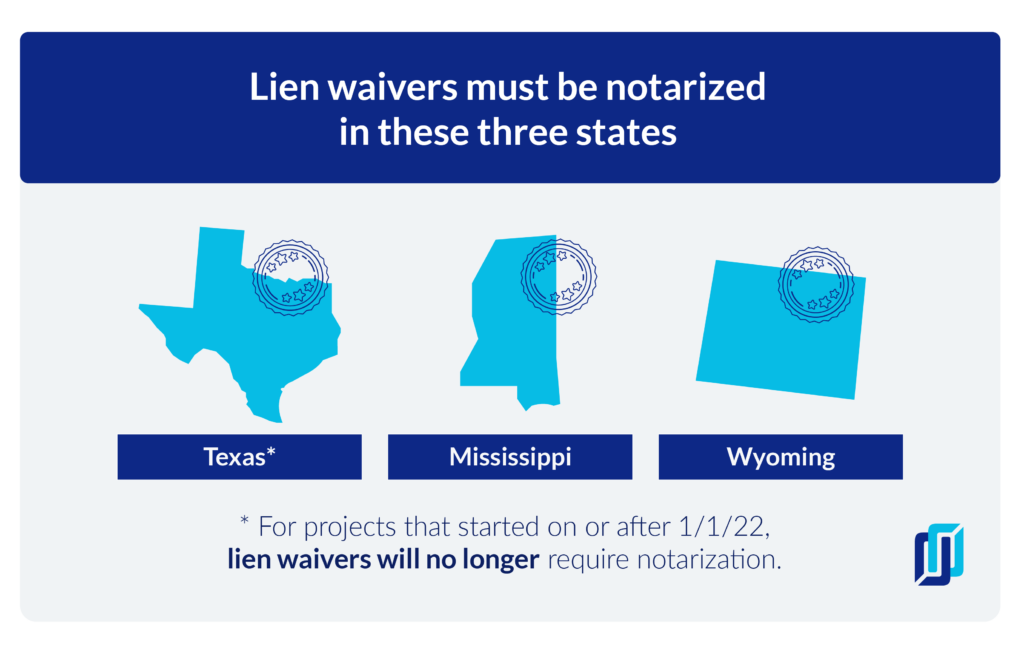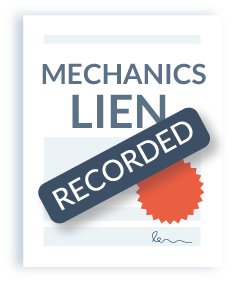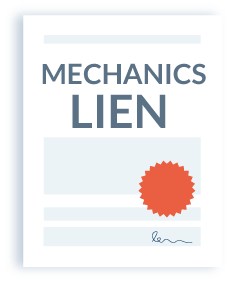
In times like these, getting a document notarized can be difficult. Some construction contracts have language that requires contractors to notarize certain payment documents. They may ask you to notarize lien waivers or payment applications. If you’re in certain states, you might be required to notarize a mechanics lien. But your company still needs to get paid. What can you do to satisfy the document requirements for a notary without jeopardizing your health to do it? Let’s explore the options for notarizing construction payment documents remotely.
Notarizing mechanics liens during COVID-19
If you haven’t been paid for your work on a construction project and are considering filing a mechanics lien, take care. A majority of states require notarization as part of a mechanics lien filing. If you want to record a lien claim in one of these states during the pandemic, it’s important to understand the challenges – and your options.
During a pandemic, meeting face-to-face is difficult. Notarization typically requires that the notary and the person signing the document be in the same room. These days, even if a notary is accessible, it can be difficult to be together with social distancing requirements. Add the fact that many construction office staff are remote. The people charged with notarizing these documents are working from home. It makes scheduling a signing a nightmare.
Many businesses that typically have notaries are closed or aren’t allowing visitors. Notaries are usually found in banks or attorneys’ offices, both of which may be closed or only seeing select clients. If you don’t have a notary in your construction company’s office, you may be out of luck.
Asking your credit manager or other staff to make a trip to the notary for a mechanics lien claim is a tricky proposition. People are scared and want to stay healthy. There is added stress when leaving the house, even the most essential trips (like securing your right to payment). Asking employees to go out in public to get a document notarized will add even more stress, and may even put their health at risk.
The good news: For most documents, notarization is unnecessary
The simple truth is that, aside from mechanics liens in certain states, most construction documents don’t require notarization. Only three states require notarization on lien waivers.* And in two of the states – Mississippi and Wyoming – the statute doesn’t explicitly mention notarization. However, the forms include a section for a notary, so it’s still considered best practice to follow.
*Note: In Texas, for projects starting on or after 1/1/22, lien waivers will no longer require notarization.
The AIA’s standard construction payment application includes a section for notarization, even though that level of oversight doesn’t make much sense.


Texas rules for mechanics liens and notices are subject to major changes in 2022.
The information on this page has already been updated to reflect the new rules.
Options for notarizing payment documents remotely
If the notaries are closed in your area, or you don’t feel comfortable sending staff to interact with the notary public, here are some alternatives.
Assign a notary agent
Levelset has in-house notaries that notarize payment documents for construction business, acting as an agent. A contractor or supplier can designate Levelset as their agent, giving staff the ability to sign and notarize lien waivers, mechanics lien forms, or other documents as necessary on their behalf. In addition, they facilitate delivery of the documents for filing with the local county recorder.
As an added bonus, Levelset’s Scout research team reviews and verifies information about the property and parties listed in the document, ensuring that it’s accurate and free of costly errors.
Remote online notarization
Starting in 2012, many states have been slowly adopting remote online notarization (RON). With the current pandemic and stay-at-home orders, many more states have issued temporary orders that allow this type of notarization. Pennsylvania and New Jersey both signed a “Temporary RON Statute,” as well as Rhode Island and Massachusetts.
Pennsylvania’s statute permits notaries to perform their services with communication technology that:
(1) allows a notary public located in the Commonwealth of Pennsylvania and a remotely located individual to communicate with each other simultaneously by sight and sound and (2) makes reasonable accommodations for those with vision, hearing, or speech disabilities.
RON is performed in the virtual world. A contractor can use a web portal to upload a mechanics lien form that requires notarization. This allows both the notary and the signer to access the document simultaneously. Through video conferencing, the notary verifies the identity and qualifications of the person signing, and witnesses the person signing the document electronically (with a mouse or by using their finger).
The notary completes their portion of the document, and an electronic copy of the notarized document is sent to both parties. A video recording of the entire transaction is kept in safe storage, along with the digital file of the document, in case it is needed for legal reasons.
RON is not allowed in all states; notable exceptions include California and Oregon. Due to the fluid nature of the pandemic and the various orders, we recommend you get up-to-date information at the National Notary Association website. There are specific requirements in each state, so make sure you know what is necessary before you attempt RON.
You will also want to check with your GC or property owner to ensure that they will accept RON. Since documents are notarized electronically, there is no “original.” A printout of a remote notarized document will essentially be a copy, and some clients may not accept copies. It pays to ask before spending the time and money on a remote notarization.
Mobile notary service
If you can’t get to a notary, you may be able to call one to come to you. Mobile notaries are used extensively in real estate, so there is bound to be one in your area. However, depending on whether they are considered an essential service, they may or may not be operating at this time. You will have to take precautions when meeting, but you can do it from the comfort of your home or office without having to go out in public.
Certify an office employee as a notary
If you are still working in the office and don’t have a notary on staff, now might be a good time to ask one of your employees or coworkers to become a notary. If a particular member of your office team is typically responsible for notarizing pay applications or lien waivers, they would be a good option.
The process of notary certification is fairly simple, though it will differ by state. While becoming a standard notary may take weeks, a remote notary registration only takes a few hours. The costs for remote notary include software, registrations, identity checks, and a per signature fee.
Becoming a traditional notary may take a few weeks, depending on how fast the state agencies are working and how soon you can get your seal or stamp. For example, in Oregon you will need to take a free online class, followed by a free test. You will then get a completion certificate, which needs to be sent into the state with a small fee to get your notary registration. Once you receive your registration in the mail, you can order your stamp or seal from an office supply store. Finally, you stamp your registration document and return it to the state, and you are officially a notary.
Going through this process may not save you much time or money now, but a notary registration is good for up to four years and there aren’t many costs for a standard notary. RON registrations are different, as specific software is often required, as well as a fee for each document notarized and identity verification.
Ask the GC or property owner to waive the requirement to notarize
The most convenient and safest option is to ask the GC or property owner to remove the notary requirement during the pandemic. You may think it’s outrageous to even ask, but it works.
A friend who works for a general contractor in Oregon said they recently requested the notary requirement be waived for releases and other documents from two major restaurant chains, and both accepted. “They were hesitant at first,” the contract administrator for the company said. “But their legal team eventually agreed.” For one of the companies, final lien waivers will have to be notarized and turned in again after the pandemic is over, but progress payments can continue based on non-notarized waivers.
Except in a very few states, there is no reason to require a notary on a lien waiver or other payment document. When asking customers or banks to waive this requirement, it’s helpful to know whether your state requires notarization or not. If your customer still insists on requiring a notary, look to one of the other solutions available in your state.



